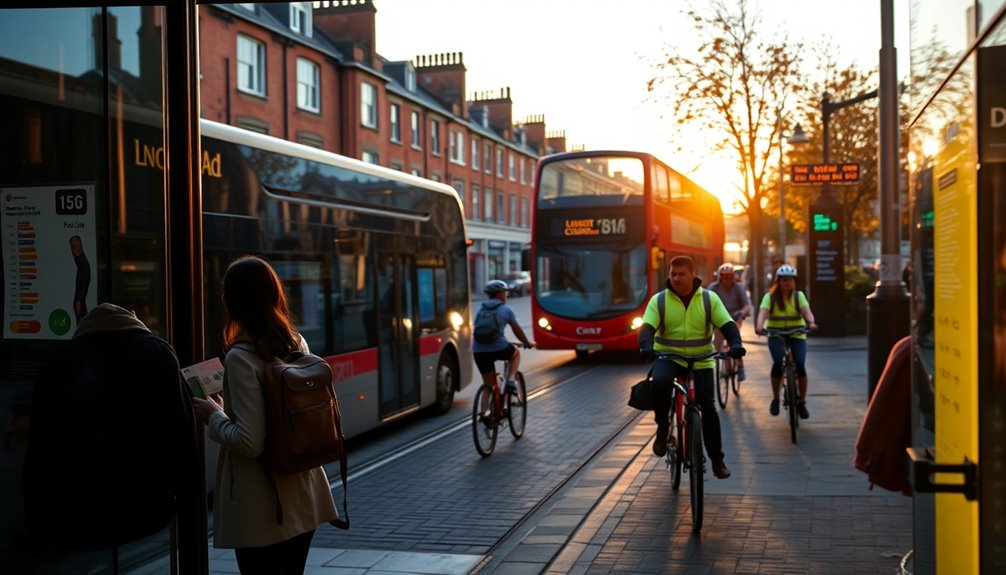
You’ll typically need €900–€1,600 a month to cover rent, bills, food and transport, depending on city and whether you share a flat or live on campus. Expect extra for utilities, internet and occasional GP or pharmacy visits. Use student cards for cheaper travel, meals and phone bundles, and consider part‑time work to help with bills. Keep a small emergency fund for medical or winter heating spikes, and keep going to see detailed tips and cost breakdowns.
Highlights
- Expect higher rent in Dublin; shared housing or campus dorms significantly reduce monthly accommodation costs.
- Budget €40–€60 per GP visit; check student health schemes or private insurance for savings and faster access.
- Cook at home, use discount supermarkets, and buy seasonal produce to lower monthly food expenses.
- Use Student Leap Card and off-peak travel to cut public transport costs; consider commuter rail for longer distances.
- Choose pay-as-you-go mobile plans if usage is low; compare bundles and student discounts for best value.
Monthly Rent and Accommodation Options for Students
One common expense you’ll face as a student in Ireland is rent, which varies widely by city, neighborhood, and accommodation type. You’ll weigh freedom against cost: opting for shared housing gets you lower rent and more independence, while campus dormitories give convenience, built-in social life, and shorter commutes. In cities like Dublin you’ll pay more; smaller towns offer cheaper options. If you crave autonomy, look for private flats or shared houses where you control your routine and guests. If you want structure and ease, dormitories handle maintenance and often include utilities. Shop around, visit places, and read contracts carefully so you keep flexibility without unexpected commitments. Choose what lets you study, explore, and live freely.
Utilities and Internet Expenses to Expect
Although rent often grabs most attention, utilities and internet are regular bills you’ll need to factor into your budget. You’ll deal with various utility providers for electricity, gas and water; some bills are included in student housing, but shared flats usually split costs, so agree a fair system early. Winter usage pushes bills up, so plan a buffer and consider energy-efficient habits to keep freedom without financial strain. For connectivity, compare internet packages — entry-level broadband covers streaming and study, while faster plans suit roommates or gaming. Look for flexible contract lengths or student discounts, and check installation times if you value moving quickly. Clear communication and upfront research let you control costs and maintain independence.
Typical Food and Grocery Costs in Irish Cities
Groceries in Irish cities tend to be pricier than you might expect, especially if you stick to branded products or eat out often. You’ll find ways to keep costs down by planning, comparing stores, and cooking at home. Embrace independence: shop local markets, join student deals, and learn simple recipes that stretch ingredients. Focus on grocery shopping habits and smart food budgeting to preserve freedom and fun.
- Buy seasonal produce at farmers’ markets when you can
- Use discount supermarkets and loyalty apps for staples
- Cook in batches to save time and money
- Share bulk purchases with flatmates to cut per-person cost
- Limit eating out; reserve treats for weekends
These tactics help you control spending without sacrificing choice.
Public Transport and Commuting Prices

Getting around as a student in Ireland is cheaper if you use a Student Leap Card, which cuts fares on buses, trams and trains. You’ll want to compare commuter rail and intercity train options for longer trips and check schedules for peak vs off-peak prices. Also look at local bus routes and fare caps to plan the most cost-effective daily commute.
Student Leap Card Savings
If you travel by bus, tram or train while studying, the Student Leap Card can cut your commuting costs considerably by giving you discounted fares and monthly passes tailored for students. You’ll appreciate the student discounts and card benefits that give you flexibility and control over where you study, work and explore. Activate online, top up with credit, and tap on/off for easy travel.
- Reduced single fares for buses and trams
- Discounted monthly and annual student passes
- Off-peak and multi-operator savings
- Online top-up and balance protection
- Reduced fares for occasional journeys
The card’s freedom-focused design means you won’t be tied to expensive tickets. It’s straightforward, portable and ideal if you’re juggling classes, part-time work and weekend plans across town.
Commuter Rail and Trains
While you’ll find buses and trams handy for short trips, commuter rail and regional trains are often the fastest and most reliable way to travel between cities and outer suburbs — especially during peak hours when road traffic slows. You’ll enjoy freedom to plan spontaneity around clear commuter schedules that run regularly into major hubs. Tickets can be pricier than local buses, but you’ll often get value from multi-ride passes, student fares and seasonal train discounts that cut costs for regular travel. Trains are more comfortable for longer commutes, with room for bikes and luggage, letting you live unburdened. Check national rail apps for real-time updates and cheap advance fares so you can move efficiently and affordably.
Bus Fares and Routes
Because buses cover the widest range of routes across cities and suburbs, they’re often the most practical and affordable way to get around on a student budget. You’ll find frequent services, flexible bus routes, and clear fare zones that keep costs predictable. If you want freedom to explore, you can mix single fares, day passes, or monthly student tickets to suit your schedule.
- Choose routes that link campus, shops, and nightlife directly.
- Check fare zones to avoid surprise costs on longer trips.
- Buy a reloadable travel card for cheaper fares.
- Use apps for real-time tracking and planning.
- Consider off-peak travel to save money and time.
Ride smart, stay mobile, and keep budgeting simple.
Mobile Phone Plans and Data Costs
You’ll need to weigh pay-as-you-go versus contract options to see which fits your budget and usage patterns. Pay-as-you-go can be cheaper if you use little data, while contracts often give bigger monthly allowances and extras. Compare data prices and allowances carefully to avoid unexpected top-ups or roaming charges.
Pay-As-You-Go Vs Contracts
Wondering whether Pay-As-You-Go or a contract plan suits you best? You’ll want freedom, so weigh prepaid plans against contract benefits clearly. Pay-as-you-go keeps you untethered, lets you control spending, and avoid credit checks. Contracts give stability, often cheaper minutes and extras, but tie you in.
- Flexibility: prepaid plans let you top up when needed.
- Predictability: contracts offer fixed monthly bills.
- Commitment: PAYG has no long-term lock-ins.
- Perks: contracts may include bonuses like international minutes.
- Budget control: PAYG prevents surprise charges if you’re careful.
Think about how often you switch providers, travel, or need consistent service. If you crave mobility and control, PAYG usually fits; if steady service and perks matter, consider a contract.
Data Allowances and Costs
Data allowances determine how much internet you can use each month before speeds are slowed or extra charges kick in, so pick a plan that matches your study, streaming and travel habits. You’ll want flexible data plans that let you top up or pause as semesters change, keeping costs low when you’re offline or abroad. Check roaming rules and whether unlimited promises throttle after a cap. Think about tethering for laptop work, and choose coverage options that reach campus, student housing and weekend trips — urban networks differ from rural ones. Compare pay-as-you-go bundles and short-term contracts to stay mobile and in control. Aim for a balance: enough data to live freely without paying for what you won’t use.
Course Materials, Printing and Study Supplies
Course materials and study supplies are a regular part of student budgets in Ireland — textbooks, lab manuals, printing credits and stationery can add up quickly, so it helps to plan ahead. You’ll want to shop around for textbooks pricing and use online resources or second‑hand options to keep costs down. Don’t forget occasional course-specific items like lab coats or software licenses.
- Buy second‑hand or share textbooks with classmates
- Use university libraries and free online resources for readings
- Top up campus printing credits sparingly; print double‑sided
- Choose durable stationery and a reliable laptop bag
- Check student discounts for software and e‑textbooks
With a flexible approach, you’ll protect your budget and keep study freedom intact.
Health Insurance, GP Visits and Pharmacy Expenses
You’ll want to know your health coverage options as a student in Ireland, from public entitlements to private or university plans. GP visits can cost around €40–€60 without a scheme, so factor that into your budget. Over-the-counter and prescription medicines vary, but common items usually cost a few euros to €20+ for prescriptions.
Health Coverage Options
Although public healthcare in Ireland covers many urgent and hospital services, you’ll still want to understand private health insurance, GP visit costs and typical pharmacy charges so you can budget properly. You’ll choose coverage that fits your desire for flexibility — whether relying on public health access or topping it up with private plans. Know typical GP fees, walk-in clinic options, and how pharmacies charge for over-the-counter items versus prescriptions. Compare student discounts and travel insurance for short stays.
- Consider private health for faster specialist access
- Check eligibility for public health schemes and GP visit cards
- Look for student or age-based plan discounts
- Use university health centres and student GP lists
- Keep a small emergency fund for unexpected consultations
Typical Medicine Costs
After deciding how you’ll handle broader health coverage, it’s useful to look specifically at the out-of-pocket costs you’ll face for medicines, GP visits and pharmacy services. You’ll usually pay a GP fee of €50–€60 for a short visit unless you’re covered by a student plan or public scheme. Prescription costs depend on whether you qualify for medical card supports; without one, expect co-payments and occasional full-price medicines. Over the counter medications like painkillers and cold remedies are cheap but add up if you rely on them regularly. Pharmacy advice is often free, but private consultations can carry a small fee. Budgeting a modest monthly sum for prescription costs and intermittent GP visits gives you flexibility and freedom to focus on studies.
Social Life, Entertainment and Night Out Budgets
When you’re budgeting for student life in Ireland, don’t forget to set aside money for socialising and nights out—these costs add up quickly and vary a lot depending on city and lifestyle. You’ll want to balance saving with enjoying nightlife options and hunting down budget friendly events so you can explore freely without overspending. Plan a weekly social pot and track outings; keep some cash for spontaneous fun.
- Pub nights: cover charge, pints or non-alcoholic drinks
- Live music: tickets, travel, tips
- Clubbing: entry fees, coat check, taxis
- Cultural nights: cinema, theatre, student discounts
- Meetups & markets: small purchases, food stalls
Stick to limits that let you socialise and still feel financially independent.
Part-time Work, Tax Rules and Earnings Expectations

If you take on a part-time job while studying in Ireland, you’ll find it’s a practical way to cover living costs but you’ll need to understand how hours, wages and taxes interact so you don’t get caught out. You’ve got varied part time opportunities in hospitality, retail and campus roles that suit flexible schedules, letting you keep control over study and social life. Expect entry wages around the national minimum or slightly higher in cities; shifts can add up without wrecking your freedom if you choose evenings or weekends. Learn basic tax implications: register with Revenue, check your tax credits and claim refunds if overpaid. Keep records, avoid exceeding work limits attached to visas, and balance earnings with the lifestyle you want.
Practical Money-saving Tips and Student Discounts
Because every euro counts on a student budget, learning simple saving habits and hunting down discounts can make a big difference to your day-to-day spending. You’ll want practical student budgeting and frugal living strategies that keep you flexible and independent without feeling deprived. Focus on routines that free up cash for travel, social life or savings.
- Buy groceries in bulk, cook with housemates and share leftovers.
- Use student cards for transport, museums, cinema and tech deals.
- Hunt local markets, clearance racks and student-only promotions.
- Switch to pay-as-you-go or capped mobile plans and energy-saving routines.
- Track expenses with a simple app, set weekly limits and adjust your habits.
These moves preserve freedom, reduce stress and let you enjoy life in Ireland without overspending.
Some Questions Answered
Can English Student Loans Be Used While Studying in Ireland?
Yes — you can often use English student loans while studying in Ireland, but tuition fees coverage and loan eligibility depend on your course, institution and residency status, so check specific UK loan rules and confirm eligibility before you commit.
How Does Brexit Affect Travel Documents for Short Trips Home?
Brexit tightened travel restrictions: you’ll need to check updated document requirements before short trips home. You’ll likely need a valid passport (and possibly visas or ID checks), so keep copies, register travel, and stay flexible for border changes.
Are There Specialized Student Banks or Accounts for International Students?
Yes — you can get dedicated student accounts that feel life-changing: international banking options often include low fees, easy transfers and student account benefits like overdrafts, discounts and mobile banking so you can keep your independence and travel freely.
What Paperwork Is Needed to Open a Bank Account in Ireland?
You’ll need ID (passport), proof of address, student ID and proof of enrollment; banks may ask for PPSN or visa documents. Check bank account requirements and international student eligibility—choices vary, so pick the option that best lets you move freely.
Will My UK Driver’s Licence Be Valid for Driving in Ireland?
Yes — you can drive on your UK licence in Ireland for a while; like a bird migrating, you’ll follow driving regulations and, if you stay long-term, you’ll need a license exchange to fully settle and keep your freedom on the road.
Summing Everything Up
You’ll manage fine — think of your budget like a Dublin tram: slow at first, then smoother once you know the stops. I once met an English student who tracked every euro and cut takeaways, and within two months her balance looked calmer than a canal at dawn. With student cards, part-time shifts, and simple habits (cook, split rent, use buses), your money will stretch further than you expect. Stay flexible and check prices often.
